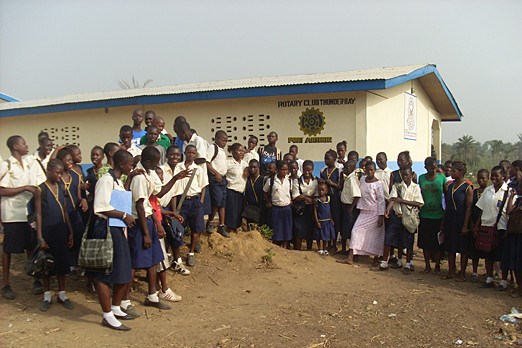With no identification and no other way to prove she was a citizen of Sierra Leone, Annie Musa thought she was as good as dead.
The 12-year-old-girl and her family lived near a bridge that soldiers used to stage executions and dispose of bodies. The killings happened frequently, so it wasn’t uncommon for her to see corpses lying in the water.
One day she was playing cards with a family member on her porch when a group of armed men told her to follow them. They demanded to see her identification card to prove she was a citizen. Being only in primary school, she didn’t have a card to show.
Musa thought she was going to die.
“It’s horrible and it was terrifying,” Musa says years later, remembering that day. “We were pretty lucky. They asked us to provide some ID to prove that we were citizens of the country, at the time I was in primary school, and they didn’t issue ID cards so I didn’t have anything to prove whom I was. They felt sorry for us and they were like ‘OK you guys can go home.’”
Musa grew up during the Sierra Leone civil war that left 50,000 people dead.
The eight-year conflict erupted in 1991 because of accusations of government corruption following the end of the British rule in 1961.
The war left the country’s economy in ruins and forced thousands of people to other countries, many of whom fled to Canada.
Musa escaped with her family to a nearby country of Gambia and spent four years there. They eventually made their way to Canada in 2003 and settled in Thunder Bay where she now lives and raises her 18-year-old-daughter.
Now she says she finally feels free.
“I have seen people being killed,” she says.
“There was no helping psychologically because I had nightmares every time I thought about it. I guess I’m strong. Moving to Canada helped in a lot of ways. I’m not living there so I don’t have to think about it except when people ask me. Moving here helped me a lot.
“I felt free coming to Canada because when I used to live in Sierra Leone it was really hard my parents to provide the basics. We would actually go without food for some day. I was in school but I dropped out because they couldn’t afford to pay my school fees. Coming here was a huge freedom for me.”
Musa has visited her home country and says she still has a deep connection to where she’s from. She’s amazed by the changes since she fled and saw that the country she once feared had become a better place.
Part of that change happened because of people like fellow countryman Bassie Kargbo.
The 31-year-old father of four says he never even heard of Canada before he came to the country, but has grown to love his adopted home.
Although, he says he still wants to help those that he’s left behind.
A friend called Kargbo in 2008 and asked if he was interested in helping to build a school in one of the smaller villages. They completed the school a year later but it wasn’t an easy task.
Kargbo says he had to jump through many hoops to make sure that they could build the school. While other schools were already available, Kargbo says they were usually in poor conditions and weren’t up to the same standards as western schools.
“Our intention is to introduce a western style education in some way,” Kargbo says. “The first person I called when I started the process was my sponsor. She also has a passion for Africa because she helped sponsor a group to come to Canada so I called her and this is the task ahead and if she wants to be a part of it. She joined me and we started one step at a time.”
He says last year they wanted to build another school in the same area but had to adjust plans a bit after some members of the community complained. The school they built was for primary school but it also acted as a secondary school.
Kargbo says the community grew after the government deemed the town a temporary location for refugees.
“It’s not like a village – it’s a big town,” he says. “You can imagine all the people from different provinces to seek an area they can live for the meantime. Life is really tough. When I went there last year, it was really horrible. It was horrible to see the kinds of shelter these people were living in.”
Kargbo says the Rotary Club of Thunder Bay contributed to about 60 per cent for the total cost of the school. Without the club’s help, as well as other donors, they wouldn’t have been able to build the school, he says.
There are a number of items on the list but Kargbo says he has to prioritize. The school needs electricity before they can even think about getting computers.
Kargbo, a student at Lakehead University, says given all that he’s gone through and how difficult it was to leave, he still feels he needs to give something back.
“I just have a passion for helping other people,” he says.
“It’s just a passion for me. I’ve been helped to come to Canada. There’s things I can do here to help like volunteering but people have enough here. So the only I can do to promote education is to help my own country so those that don’t have access can have that same privilege even if they have to walk 10 miles to go to school. It’s an opportunity instead of not having an opportunity at all.”
